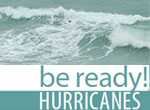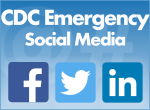Evacuate or Stay at Home

If a hurricane is coming, you may hear an order to evacuate (leave your home). Never ignore an order to evacuate. Even sturdy, well-built houses may not hold up against a hurricane. Staying home to protect your property is not worth risking your health and safety.
You may also hear an order to stay at home. Sometimes, staying at home is safer than leaving.
If you need to evacuate:
- Only take what you really need with you, like your cell phone, chargers, medicines, identification (like a passport or license), and cash.
- Make sure you have your car emergency kit.
- If you have time, turn off the gas, electricity, and water. Also unplug your appliances.
- Follow the roads that emergency workers recommend even if there’s traffic. Other routes might be blocked.
If you need to stay home:
- Keep listening to the radio or TV for updates on the hurricane.
- Stay inside. Even if it looks calm, don’t go outside. Wait until you hear or see an official message that the hurricane is over. Sometimes, weather gets calm in the middle of a storm but then gets worse again quickly.
- Stay away from windows. You could get hurt by pieces of broken glass during a storm. Stay in a room with no windows, or go inside a closet.
- Be careful. Winds can blow debris — like pieces of broken glass and other objects — at high speeds. Flying debris is the most common cause of injury during a hurricane. You’re also at a higher risk of breaking a bone or cutting yourself on loose nails, metal, or other objects.
- Be ready to leave. If emergency authorities order you to leave or if your home is damaged, you may need to go to a shelter or a neighbor’s house.
What’s next?
- Page last reviewed: September 5, 2017
- Page last updated: September 5, 2017
- Content source:
- National Center for Environmental Health (NCEH); Agency for Toxic Substances and Disease Registry (ATSDR); Office of Noncommunicable Diseases, Injury, and Environmental Health (ONDIEH); National Center for Chronic Disease Prevention and Health Promotion (NCCDPHP); National Center for Birth Defects and Developmental Disabilities (NCBDDD)


 ShareCompartir
ShareCompartir


